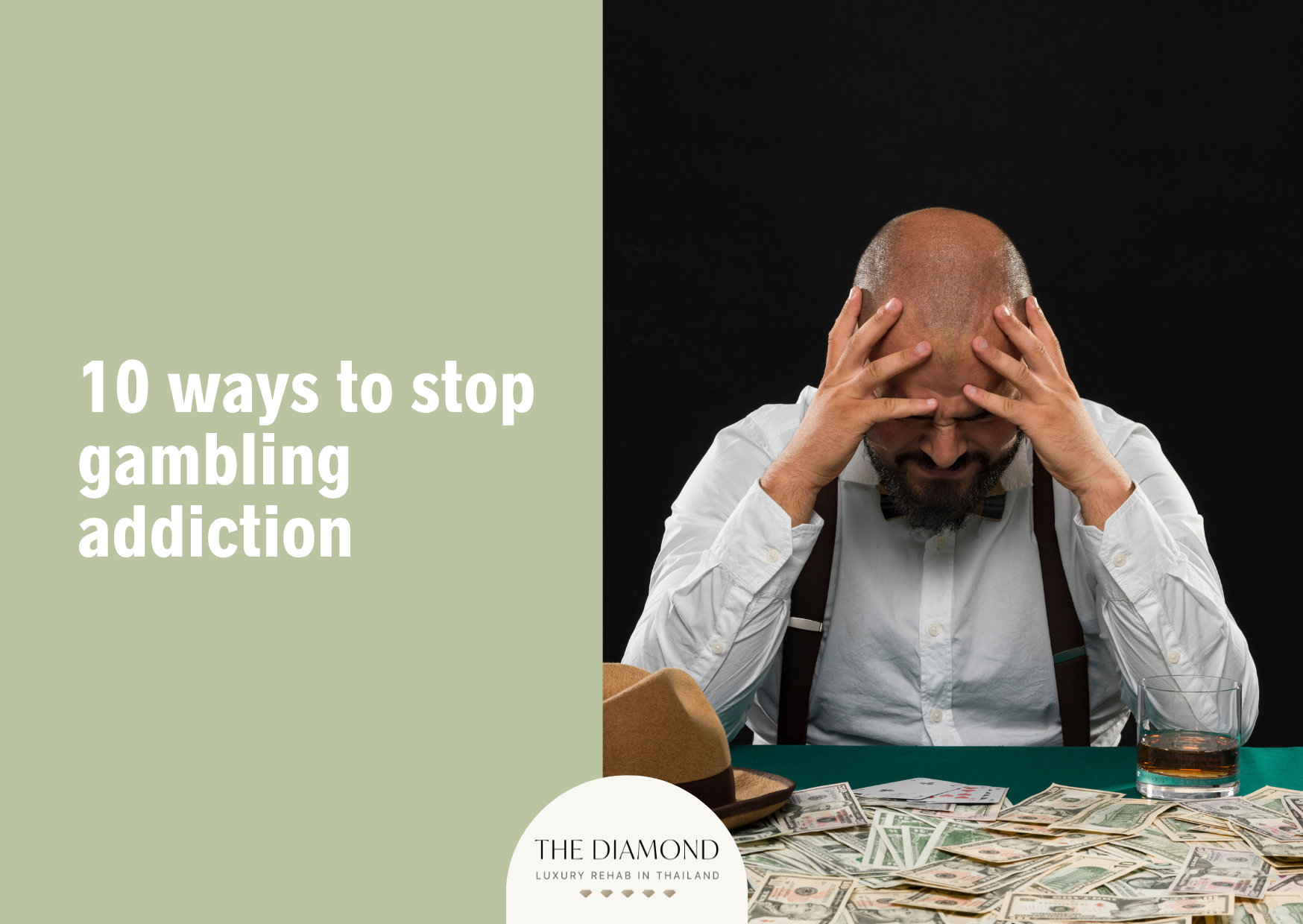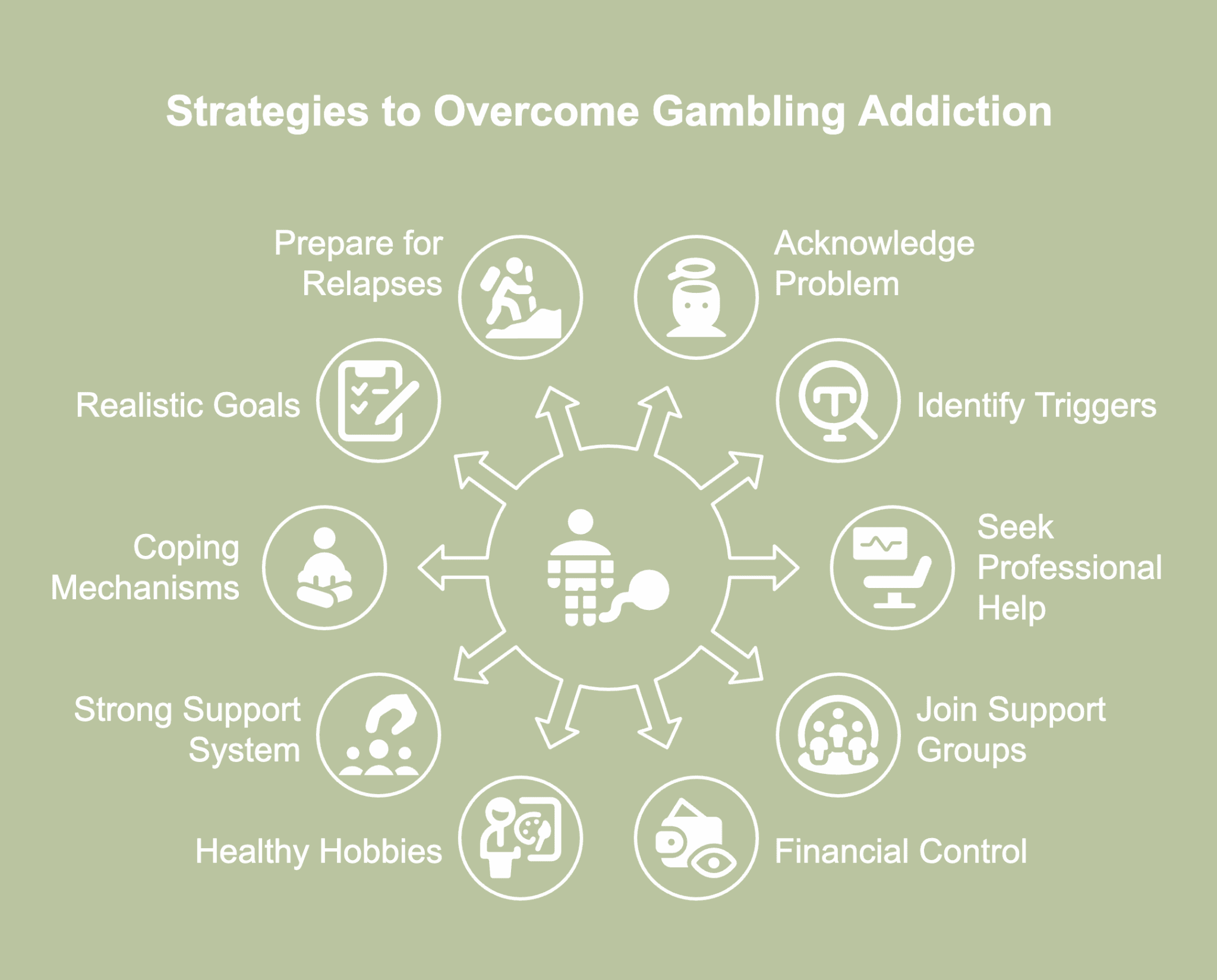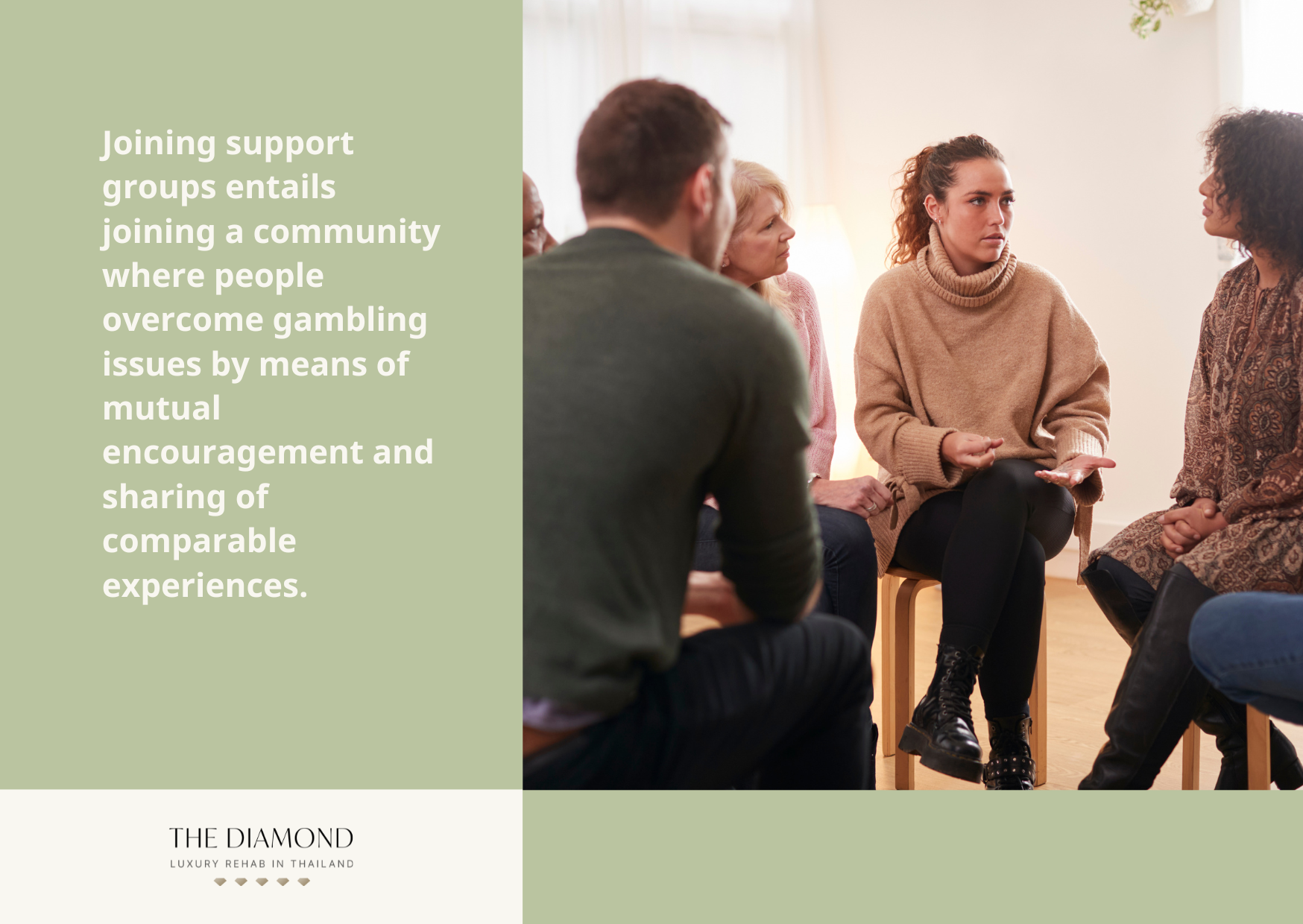10 ways to stop gambling addiction
Table of content
- What does it mean to stop gambling addiction?
- What are the 10 ways to stop gambling addiction?
- 1. Acknowledge and accept the gambling problem
- 2. Identify and avoid triggers
- 3. Seek professional help
- 4. Join support groups
- 5. Create and implement financial control
- 6. Find healthy hobbies and alternatives
- 7. Create a strong support system
- 8. Develop healthy coping mechanisms
- 9. Set realistic goals and take things one day at a time
- 10. Be ready for relapses

Stopping gambling addiction means ending the compulsive urge to gamble despite harmful consequences. Usually through treatment, support, and lifestyle adjustments, quitting gambling entails breaking the psychological and behavioral patterns fueling the addiction.
The 10 ways to stop gambling addiction are to acknowledge and accept the gambling problem, identify and avoid triggers, seek professional help, join support groups, create and implement financial control, find healthy hobbies and alternatives, create a strong support system, develop healthy coping mechanisms, set realistic goals and take things one day at a time, and be ready for relapses.
What does it mean to stop gambling addiction?
Stopping gambling addiction means abandoning the destructive cycle of problem gambling and reclaiming authority over one’s own actions and choices. Overcoming the addiction calls for addressing the emotional triggers, mental patterns, and behaviors driving the impulse to gamble, apart from willpower.
Support from professionals, family, or recovery groups often plays a key role in the process. Due to online gambling addiction, several individuals encounter increased difficulties as betting platforms become more accessible and alluring. The risk of relapse and the depth of the habit are both exacerbated by the perpetual availability of online options.
Incorporating structure into daily routines mitigates exposure to triggers and reinforces progress. Eliminating gambling addiction paves the way to improved relationships, emotional health, financial security, and stability via major life transformations.
What are the 10 ways to stop gambling addiction?

10 ways to stop gambling addiction refer to a list of practical strategies designed to help individuals quit gambling and regain control over life decisions and behavior. The 10 ways to stop gambling addiction are listed below.
- Acknowledge and accept the gambling problem
- Identify and avoid triggers
- Seek professional help
- Join support groups
- Create and implement financial control
- Find healthy hobbies and alternatives
- Create a strong support system
- Develop healthy coping mechanisms
- Set realistic goals and take things one day at a time
- Be ready for relapses
1. Acknowledge and accept the gambling problem
Acknowledging and accepting the gambling problem refers to honestly recognizing the presence of harmful gambling behavior and understanding the condition’s negative effects without shifting blame or making excuses.
Such a mental shift plays a vital role in efforts to stop gambling, as meaningful recovery begins with self-awareness and personal responsibility. A person is likely to begin the process of change by embracing the issue and overcoming denial.
Taking the first step helps one to be more receptive to advice, assistance, and encouragement from loved ones. Without acknowledgment, attempts to stop gambling often remain shallow or short-lived. The process lays the groundwork for deeper commitment, making long-term recovery more achievable.
2. Identify and avoid triggers
Identifying and avoiding triggers describes the recognition of specific situations, emotions, environments, or thoughts leading to the urge to gamble and deliberately maintaining distance.
Identifying and avoiding triggers work by disrupting the cycle connecting certain experiences to gambling actions. Once patterns are recognized, individuals are able to replace gambling-related responses with healthier coping strategies or avoid risky situations entirely. A shift in behavior supports the effort to give up gambling more effectively.
Relapse prevention and sustained recovery are directly related to the importance of recognizing and avoiding triggers. Using the approach routinely helps people become more self-aware, disciplined, and ready to fight off temptation. Steer clear of gambling triggers to keep control and make room for healthier decisions.
3. Seek professional help
Seeking professional help means contacting qualified professionals—such as therapists, counselors, or addiction specialists—for direction in controlling and conquering destructive gambling behavior. Professional help consists of organized therapy schedules, sessions, or counseling catered to specific needs.
Getting expert assistance works by providing a safe environment where one is able investigate the causes of the addiction and work with the expert in creating individualized remedies.
Therapists help identify patterns, manage triggers, and build healthier coping mechanisms reducing the urge to gamble. With consistent support, individuals gain the structure and accountability needed to break free from gambling.
The value of getting professional assistance is found in the direction and experience the step offers towards recovery. Professional support often makes the difference between repeated relapse and sustained progress.
According to a 2022 paper by Bijker et al., titled “Global prevalence of help-seeking for problem gambling: A systematic review and meta-analysis,” the worldwide prevalence of help-seeking for problem gambling (PG) among the general population is 0.23%, with markedly elevated rates of 3.73% for moderate-risk gamblers and 20.63% for problem gamblers.
4. Join support groups

Joining support groups entails joining a community where people overcome gambling issues by means of mutual encouragement and sharing of comparable experiences. Support groups often provide a non-judgmental space to speak openly, exchange coping strategies, and stay accountable. Common formats include in-person meetings or online sessions led by peers or trained facilitators.
Support groups work by fostering a sense of community and lowering marginalization among people going through similar struggles. Hearing other points of view changes the way one thinks and provides fresh approaches to controlling cravings. With regular participation, many individuals find the strength to end gambling habits and stay focused on recovery.
The continuous motivation and emotional support provided by shared experiences is what makes joining support groups important. Group settings create a structure reinforcing commitment and building resilience.
While social support generally improves well-being, the effectiveness of participating in the support group Gamblers Anonymous (GA) seems to result from the sense of belonging it delivers, which is essential for lowering gambling urges, according to a 2024 paper from Katy L. Penfold and Jane Ogden, titled “The Role of Social Support and Belonging in Predicting Recovery from Problem Gambling.”
5. Create and implement financial control
Creating and implementing financial control denotes the development of a structured plan to regulate money, restrict access to expenditure, and prevent gambling-related financial activity.
Limiting access to accounts, creating budgets, and keeping tabs on spending are all parts of the strategy to curb gambling transactions. Assuming control of finances mitigates temptation and reinstates a sense of order.
Creating and implementing financial control works by eliminating opportunities to spend money on gambling and addressing financial risk factors directly. Through putting precautions in place, like third-party money management or self-exclusion systems, less money is available for betting. Such initiatives help people let go of gambling by eliminating important triggers associated with financial freedom.
Preventing more financial harm and safeguarding healing progress is where the importance of financial control resides. Reestablishing stability and reducing debt are a few of the outcomes of disciplined financial management.
6. Find healthy hobbies and alternatives
Finding healthy hobbies and alternatives means finding fun, significant activities giving stimulation, enjoyment, or relaxation without negative effects. Through providing more constructive ways to deal with stress or boredom, new activities take the place of time and energy spent on gambling.
For persons afflicted by gambling disorder, the stage facilitates a transition towards balance and pleasure. Finding healthy hobbies and alternatives works by redirecting focus away from gambling urges and filling the void left behind after quitting.
Since gambling addicts frequently use gambling as a means of escape or excitement, offering more healthy alternatives to gambling, such as volunteering, sports, art, or acquiring new skills, help satisfy their needs. The process develops structure, lessens temptation, and fortifies the will to quit gambling.
Gambling was proposed by a 2015 study from Subramaniam et al., titled “Prevalence and Determinants of Gambling Disorder among Older Adults: A Systematic Review” as a way to fill a “void” in the lives of older adults, serving as a substitute for social engagement or activities no longer accessible due to physical or social limitations.
The importance of healthy hobbies is in the capacity to enable long-term recuperation and revitalize a feeling of direction. Finding alternative outlets is crucial for people in recovery to create a lifestyle free from the impact of gambling.
7. Create a strong support system
Creating a strong support system is establishing a trustworthy network of people providing throughout the rehabilitation process encouragement, direction, and responsibility. A support network includes family members, friends, counselors, or peer groups committed to helping someone overcome harmful habits.
Creating a strong support system works by providing motivation, reducing feelings of isolation, and offering help during moments of temptation. Trusted individuals offer honest feedback, celebrate progress, and guide someone back on track after setbacks. With support in place, the effort to cut out gambling becomes more manageable and sustainable.
When it comes to sustaining sobriety and reiterating commitment, the importance of a strong support system resonates the strongest. Vulnerability, accountability, and personal development flourish in supportive relationships.
8. Develop healthy coping mechanisms
The process of developing healthy coping mechanisms involves the adoption of constructive strategies to manage tension, emotions, and daily challenges without resorting to harmful behaviors.
As per a 2020 report by Wang et al., titled “Stressful Life Events and Gambling: The Roles of Coping and Impulsivity Among College Students,” at-risk college students who experience stressful life events are more likely to have gambling problems; for every 100 units of stress, there is a 9% increase in problems.
The connection is moderated by gambling as a coping mechanism, with low to moderate coping motives indicating stress-driven increases in problems and high coping motives associated with chronic gambling problems independent of stress.
Activities such as exercise, meditation, journaling, or talking to someone are encouraged instead of relying on destructive outlets like gambling. For people struggling with compulsive gambling, healthy coping methods offer a safer, more balanced path forward.
Developing healthy coping mechanisms works by lowering emotional distress, developing self-control, and replacing gambling with beneficial pursuits. People are better able to control emotions and refrain from gambling when healthier ways to cope with stressful or unfavorable events are present.
The value of building healthy coping mechanisms stems from the capacity to develop inner strength and emotional stability. Positive behaviors strengthening emotional responses help people stay grounded and confidently go forward.
9. Set realistic goals and take things one day at a time

Setting realistic goals and taking things one day at a time means creating achievable, short-term objectives while focusing on steady daily progress rather than immediate transformation. Small, practical steps replace overwhelming expectations and help build confidence.
For the purpose of helping people stay focused and less likely to give up, the method operates by breaking the healing process into smaller steps. People celebrate everyday victories rather than attempting to make all the changes at once, building momentum over time. Gradual efforts create a solid path to leave gambling behind without feeling defeated by setbacks.
The significance of setting realistic goals and taking things one day at a time rests in how such a mindset promotes long-term commitment without pressure. Emphasizing little successes keeps drive alive and helps restore self-confidence.
10. Be ready for relapses
Being ready for relapses means accepting setbacks often occur during recovery and preparing mentally and practically to handle such moments without giving up. Through considering a gambling addiction relapse as a brief setback rather than a failure, the process promotes resilience.
Preparing for relapse functions by assisting a compulsive gambler in formulating a strategy for action in the event of recurrence of impulses or missteps. Strategies like identifying warning signs, contacting a trusted person, or reviewing recovery goals support the ability to regain control quickly.
Being ready for relapses is crucial since it shields long-term recovery from unforeseen obstacles. Making a plan helps one stay mentally strong and lessens the guilt or humiliation experienced when mistakes occur.

